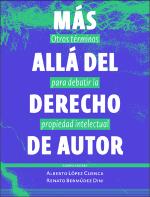Más allá del derecho de autor
Otros términos para debatir la propiedad intelectual
| dc.contributor.editor | López Cuenca, Alberto | |
| dc.contributor.editor | Bermúdez Dini, Renato | |
| dc.date.accessioned | 2022-05-19T09:55:33Z | |
| dc.date.available | 2022-05-19T09:55:33Z | |
| dc.date.issued | 2022 | |
| dc.identifier | OCN: 1301898529 | |
| dc.identifier.uri | https://library.oapen.org/handle/20.500.12657/54520 | |
| dc.description.abstract | On July 1, 2020, reforms to the Federal Copyright Act (LFDA, for its acronym in Spanish) entered into force in Mexico responding to the primarily economic requirements of the renewed free trade agreement with the United States and Canada, the USMCA. Facing these reforms, a group of Mexican and international associations and individuals raised their voices due to the numerous implications that they entailed for free speech, due judicial process, access to culture and education, technological sovereignty and their environmental impact, among others. In order to trace the deep reaching that the LFDA has today to the detriment of other rights and already established practices, from the Centro Cultural de España in Mexico City we proposed to inscribe these concerns and debate them on a broader sociocultural plane, starting from four conceptual nodes: 1) native knowledges; 2) open knowledge; 3) digital selfediting and rewriting; 4) hacktivisms. This book brings together contributions from Alberto López Cuenca, Anamhoo, David Cuartielles, Diana Macho Morales, Domingo M. Lechón, Eduardo Aguado-López, Gabriela Méndez Cota, Irene Soria, Leandro Rodríguez Medina, Marla Gutiérrez Gutiérrez, Mónica Nepote, Nika Zhenya, Renato Bermúdez Dini and Víctor Leonel Juan-Martínez. | en_US |
| dc.language | Spanish | en_US |
| dc.subject.other | federal copyright act; Mexico; free trade agreement; US; Canada; intellectual property | en_US |
| dc.title | Más allá del derecho de autor | en_US |
| dc.title.alternative | Otros términos para debatir la propiedad intelectual | en_US |
| dc.type | book | |
| oapen.abstract.otherlanguage | El 1 de julio de 2020 entró en vigor una reforma a la Ley Federal del Derecho de Autor (LFDA) en México que respondía a las exigencias prioritariamente económicas del renovado tratado de libre comercio con Estados Unidos y Canadá, el T-MEC. Frente a estas reformas, un conjunto de colectivos, asociaciones e individuos mexicanos e internacionales levantaron la voz por las numerosas implicaciones que suponían para la libertad de expresión, el debido proceso judicial, el acceso a la cultura y a la educación, la soberanía tecnológica y el impacto medioambiental, entre otras. Para rastrear el profundo alcance que en nuestros días tiene la LFDA en detrimento de otros derechos y prácticas ya afianzadas, desde el Centro Cultural de España en Ciudad de México nos propusimos inscribir estas preocupaciones y debatirlas en un plano sociocultural más amplio, a partir de cuatro nodos conceptuales: 1) saberes originarios; 2) conocimiento abierto; 3) autoedición y reescrituras digitales; 4) hacktivismos. Este libro reúne contribuciones de Alberto López Cuenca, Anamhoo, David Cuartielles, Diana Macho Morales, Domingo M. Lechón, Eduardo Aguado-López, Gabriela Méndez Cota, Irene Soria, Leandro Rodríguez Medina, Marla Gutiérrez Gutiérrez, Mónica Nepote, Nika Zhenya, Renato Bermúdez Dini y Víctor Leonel Juan-Martínez. | en_US |
| oapen.relation.isPublishedBy | f4b2eb29-a039-427a-9368-b62dcacdb4bd | en_US |
| oapen.pages | 134 | en_US |

